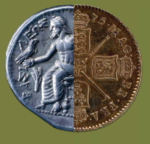By: Mike on February 21, 2019
Mark Noll’s The Scandal of the Evangelical Mind and sequel Jesus Christ and the Life of the Mind are books that evaluate, critique, provoke, and promote evangelicals toward a more intellectual relationship with Christianity. This post will read in and around both books and look for ideas, themes, and connections that can help my investigation…
By: Colleen Batchelder on February 21, 2019
 Mark A. Noll, professor of History at Notre Dame, enraptures his readers and beckons them to understand the reasoning behind their lack of reason. He delves into the facets of evangelicalism from the lens of history and challenges his readers to question the validity of their faith, not the voracity of their pursuit. For years,…
Mark A. Noll, professor of History at Notre Dame, enraptures his readers and beckons them to understand the reasoning behind their lack of reason. He delves into the facets of evangelicalism from the lens of history and challenges his readers to question the validity of their faith, not the voracity of their pursuit. For years,…
By: Andrea Lathrop on February 21, 2019
I cannot imagine the Western Christian that could read Vincent Miller’s Consuming Religion and not have at least one prick of the heart. For me, there were many. It is extremely difficult, given our embeddedness in consumerism, to imagine a world of non-consumption Christendom. Miller gives me pause and greater discomfort on what was already uncomfortable. I…
By: Dave Watermulder on February 21, 2019
Ten years after publishing his classic book, The Scandal of the Evangelical Mind, historian Mark Noll was in a reflective mood. This is the book that he is best known for, and whose famous first line that, “the scandal of the evangelical mind is that there is not much of an evangelical mind”[1], has been…
By: Chris Pritchett on February 21, 2019
Mark Noll’s work is largely a response to a wide-spread perception of the 20thcentury, namely, that Evangelicalism and scholarship seem to go together like oil and water. Noll wondered why a movement within orthodox Christianity can be filled with such passion, vigor, and commitment, while at the same time being averse to the tools of…
By: Harry Edwards on February 21, 2019
Neil Postman, an American social critic, professor and author, best known for his book Amusing Ourselves to Death, compared two dystopian visions of the future. The famous version is from George Orwell. He saw a future in which totalitarian states ruled with fear and control. His classic novel 1984 created a world in which its…
By: Mario Hood on February 21, 2019
As a pastor and marketer, I find Vincent Miller’s, Consuming Religion: Christian Faith and Practice in a Consumer Culture, fascinating on many levels. From the marketing perspective, it challenges the ethics of said industry when it comes to the commodification of religious symbols. Daryl McKee in the journal of marketing writes, “He (Miller) goes…
By: Jennifer Williamson on February 21, 2019
France. The birthplace of the Enlightenment. Here, one must be competent (or at least conversant) in philosophy in order to graduate from High School. Thinking and debating are national pastimes. In response to the Gilets Jaunes—the Yellow Jackets—President Emanuel Macron wrote a letter to all the people of France inviting them to participate in a…
By: Greg on February 21, 2019
Mark Noll writes,“coming to know Christ provides the most basic possible motive for pursuing the tasks of human learning”.1 His critique of evangelicals and their lack of desire to pursue deep thinking and constant questioning of concepts that should make us hunger for truth has encouraged me to seek how those outside the Western world…
By: Rev Jacob Bolton on February 19, 2019
I recently had a fascinating conversation with Elysa Hammond. Elysa is the Vice President of Clif Bar and their Director of Environmental Stewardship. Simplified, her job is to make sure Clif Bar uses the most delicious, healthy, organic, sustainable, earth friendly ingredients in their products – and then to make sure that those products are…
By: Jake Dean-Hill on February 19, 2019
I’m not quite sure what to think about Mark Noll’s books, The Scandal of the Evangelical Mind and Jesus Christ and the Life of the Mind. I feel like they hit me the wrong way because it seems that he comes across as saying that Christians are not intellectual when he says…“Evangelicals do not, characteristically,…
By: Shermika Harvey on February 18, 2019
When one contemplates the definition calling in ministry, it is often equated to the “calling, a religious conception, that of a task set by God.”[1] However, in The Protestant Ethic and Spirit of Capitalism Weber introduce calling as a duty in reference to one’s professional calling. He wrote, “The idea, so familiar to us today…
By: John Muhanji on February 18, 2019
When Jesus sent out his disciples out to the lost sheep of Israel, he advised them to proclaim the message of the Kingdom by healing the sick, raising the dead, driving out demons and many other miracles. He then stressed to them that they should not take any gold or silver with them after the…
By: Greg on February 16, 2019
Coming out of a week long meeting I can say that this book spoke to me (not always in a positive way) about our walk and conversations with the one true guide in this life. I am writing this both tired from travel and leading this meeting. So I hope that this response is not…
By: Harry Fritzenschaft on February 16, 2019
Max Weber contends that empirical evidence of greater Protestant participation in the ownership of capital, management, and the upper ranks of labor may be the result (but not the cause) of religious affiliation.[1] It would appear that the rejection of economic traditionalism often led to the tendency to question all traditionalism, even the traditional forms…
By: Wallace Kamau on February 15, 2019
This Quote by Gordon B Hinkley[1]is of great interest to me because life is like a battle and when you cease from fighting for the good, the bad automatically takes over. Life is about the choices that you make, knowing that every choice has consequences. God has given every person the important ability to make…
By: Mary Mims on February 15, 2019
 Living in Washington, DC can be exhausting at times. I hate to continuously write about things going on here, but it is an ever present reality. The government is in full blown crisis mode, but everything is going about as usual. Even if you try not to look at the never ending news, someone will…
Living in Washington, DC can be exhausting at times. I hate to continuously write about things going on here, but it is an ever present reality. The government is in full blown crisis mode, but everything is going about as usual. Even if you try not to look at the never ending news, someone will…
By: Kyle Chalko on February 15, 2019
I imagine the Apostle Paul hearing about this study… Tanya: “Let’s label and quantify anthropologically and psychologically effects that people experience and call “real” when they pray.” The Apostle Paul: stares blankly…. “Ok, well I’m going to go tell those people over there about the real Jesus. Bye now.” Tanya Luhrmann writes in…
By: Jean Ollis on February 15, 2019
I’m not sure how I feel about Luhrmann’s text, When God Talks Back. Luhrmann sets out to understand the American evangelical experience through personally assimilating herself into a church system. “Tanya began researching the American evangelical experience by attending weekly services at the Vineyard Christian Fellowship Church in Chicago. This church, the Vineyard, is one of…
By: Jay Forseth on February 15, 2019
Do You “Believe”? Written by: Jay Forseth on February 14, 2019 Before I jump into Luhrmann, I recognize she gives us MANY things we can EASILY discuss. I feel I must start this week’s Blog with the one word that kept coming up in my mind while reading Luhrmann’s, When God Talks Back: Understanding the American Evangelical Relationship with God. [1] The word is—“believe”. No, I’m…
 Mark A. Noll, professor of History at Notre Dame, enraptures his readers and beckons them to understand the reasoning behind their lack of reason. He delves into the facets of evangelicalism from the lens of history and challenges his readers to question the validity of their faith, not the voracity of their pursuit. For years,…
Mark A. Noll, professor of History at Notre Dame, enraptures his readers and beckons them to understand the reasoning behind their lack of reason. He delves into the facets of evangelicalism from the lens of history and challenges his readers to question the validity of their faith, not the voracity of their pursuit. For years,…
 Living in Washington, DC can be exhausting at times. I hate to continuously write about things going on here, but it is an ever present reality. The government is in full blown crisis mode, but everything is going about as usual. Even if you try not to look at the never ending news, someone will…
Living in Washington, DC can be exhausting at times. I hate to continuously write about things going on here, but it is an ever present reality. The government is in full blown crisis mode, but everything is going about as usual. Even if you try not to look at the never ending news, someone will…